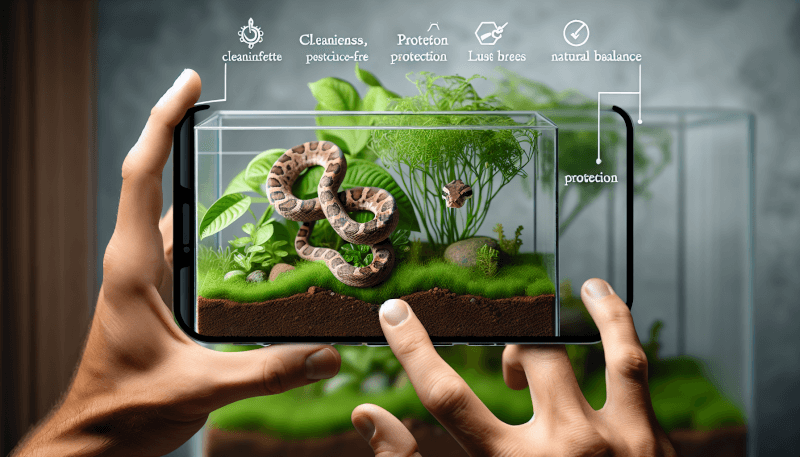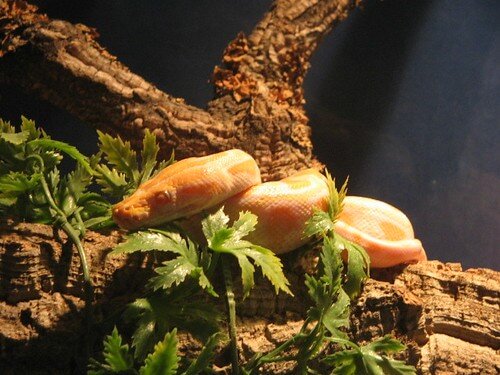If you enjoy having a snake as a pet, then you know the importance of maintaining a clean and parasite-free environment for your scaly friend. Parasites can cause serious health issues for snakes, so it is crucial to take preventive measures and control their presence in their habitat. In this article, we will explore some of the best methods to ensure a parasite-free environment for your snake, keeping them happy and healthy. From proper cage cleaning techniques to regular veterinary check-ups, we will guide you through the steps to safeguard your snake’s well-being.
Maintaining Cleanliness
When it comes to maintaining cleanliness in snake enclosures, regular cleaning is crucial. Snakes can be messy creatures, and their waste can accumulate quickly, leading to unsanitary conditions. Make sure to clean your snake’s enclosure regularly, removing any feces, uneaten food, and shed skin. This will not only keep the enclosure clean but also help prevent the growth of harmful bacteria and parasites.
Another important aspect of maintaining cleanliness is ensuring proper waste disposal. Dispose of any waste material in a responsible manner, following the guidelines provided by your local authorities. This will help prevent contamination and the spread of potential parasites to other animals or humans.
Additionally, regularly changing the substrate material is essential for maintaining a clean and healthy environment for your snake. Substrate materials, such as newspaper, reptile carpet, or aspen bedding, can become soiled over time, providing a breeding ground for parasites and bacteria. By regularly replacing the substrate, you can help minimize the risk of infestation and maintain a hygienic environment for your snake.
Lastly, don’t forget to clean and disinfect your snake’s feeding equipment regularly. Snakes can be messy eaters, and food residue left on feeding equipment can attract pests and increase the risk of contamination. Clean the feeding dishes, tongs, or other tools used for feeding with warm soapy water and thoroughly rinse them before each use.
Quarantine and Isolation
One effective way to prevent the spread of parasites in your snake’s environment is by quarantining new snakes before introducing them to your existing collection. New snakes may carry parasites without showing any symptoms, and introducing them directly into your snake’s enclosure can lead to the spread of these parasites. Quarantining new arrivals for a minimum of 30 days gives you the opportunity to observe them for any signs of illness or parasites before integrating them with your other snakes.
It is also important to isolate infected snakes to prevent the spread of parasites within your snake collection. If you notice any signs of illness, such as weight loss, abnormal shedding, or changes in behavior, isolate the affected snake immediately. This will help limit the exposure of other snakes to potential parasites and allow for targeted treatment and monitoring.
When quarantining and isolating snakes, it is crucial to implement strict hygiene practices. Wash your hands thoroughly before and after handling each snake to minimize the risk of cross-contamination. Use separate tools and equipment for each snake to prevent the spread of parasites between individuals. Clean and disinfect all snake accessories, including hides, branches, and water bowls, regularly to maintain a clean and healthy environment for your snakes.
Temperature and Humidity Control
Temperature and humidity control is essential for maintaining the overall health and well-being of your snake. Snakes are ectotherms, which means they rely on the environment to regulate their body temperature. Providing the appropriate temperature range is crucial for their digestion, metabolism, and overall immune function.
To maintain the optimal temperature range, it is important to invest in a reliable thermostat and monitor the temperature inside the enclosure regularly. Depending on the species of snake, the appropriate temperature range may vary, but generally, it should be between 75-85°F (24-29°C) during the day and slightly cooler at night. Ensure there are temperature gradients within the enclosure, allowing the snake to choose the most comfortable spot.
Adequate heat sources, such as heat lamps or under-tank heating pads, should be provided to maintain the desired temperature range. These heat sources should be positioned in a way that the snake can easily access them and regulate its body temperature as needed. Avoid placing heat sources directly against the enclosure walls to prevent burns and ensure proper heat distribution.
Humidity control is also important, as improper humidity levels can lead to a variety of health issues for your snake. Different snake species have different humidity requirements, so it’s essential to research the specific needs of your snake and provide the appropriate humidity range. Utilize methods such as misting the enclosure, providing a humidity box, or using a reptile fogger to maintain the desired humidity levels.
It’s important to note that excessive humidity can also be problematic as it can promote the growth of mold and bacteria, leading to respiratory issues and other health problems for your snake. Regularly monitor the humidity levels and adjust as necessary to ensure a healthy balance.
Regular Health Checks
Just like any other pet, snakes require regular health checks to ensure their well-being. Regularly examining your snakes helps you identify any potential health issues early on and seek the necessary veterinary care.
Perform routine snake examinations by observing your snakes for any physical abnormalities or changes in behavior. Look for signs of weight loss, abnormal shedding, visible parasites, or any other signs of illness. By checking your snakes regularly, you will become familiar with their baseline appearance and behavior, making it easier to detect any deviations that may indicate a health problem.
Parasitic infections are a common health issue in snakes, so monitoring for signs of parasites is crucial. Look for symptoms such as weight loss, decreased appetite, regurgitation, diarrhea, or excessive scratching or rubbing against surfaces. If you notice any of these signs, it is important to consult with a reptile veterinarian for proper diagnosis and treatment.
Regularly consulting with a reptile veterinarian is also recommended to ensure your snake receives comprehensive care. Veterinarians specialized in reptile medicine can provide guidance on preventive measures, conduct routine health checks, and treat any existing health issues effectively.
Proper Diet and Nutrition
Providing a balanced diet is vital for maintaining the overall health and preventing parasites in snakes. Feeding your snake a varied and species-appropriate diet helps ensure they receive all the necessary nutrients and minimizes the risk of deficiencies.
When feeding snakes, it is crucial to avoid feeding live prey whenever possible. Live prey can pose a risk of injury to your snake, and it may also introduce parasites or diseases into their environment. Instead, consider using pre-killed or frozen prey, which is readily available from reputable reptile food suppliers. These options not only eliminate the risk of injury but also reduce the chance of parasites being transmitted to your snake.
To ensure your snake receives all the necessary vitamins and minerals, it is recommended to supplement their diet. Reptile-specific vitamin and mineral supplements can be sprinkled on their food to provide additional nutrition. However, it is important to follow the recommended dosage instructions and not over-supplement, as excess vitamins or minerals can be harmful to your snake’s health.
Implementing Preventative Treatments
Preventing parasites in snakes requires a proactive approach, which includes administering appropriate parasite preventatives. There are various parasite preventatives available for snakes, including topical treatments, oral medications, or injections. These treatments are designed to target common parasites and help prevent infestations.
It is important to follow the recommended treatment schedules provided by veterinarians or reputable reptile suppliers. These schedules may vary depending on the species and age of your snake, as well as the specific parasites prevalent in your area. Regularly treating your snake with parasite preventatives can significantly reduce the risk of infestation and help maintain their overall health.
When implementing preventative treatments, it is crucial to consult with a reptile veterinarian. They can provide specific advice based on the needs of your snake and guide you in choosing the most appropriate parasite preventatives. Additionally, using parasite-free substrate and bedding materials in your snake’s enclosure helps minimize the risk of reinfestation.

Effective Hygiene Practices
Maintaining effective hygiene practices is essential for preventing parasites and ensuring the health of your snake. Practicing good hygiene not only benefits your snake but also protects you and other animals in your household.
Always wash your hands thoroughly before and after handling your snake or performing any tasks related to their care. This helps prevent the spread of potential parasites or bacteria and reduces the risk of cross-contamination between different animals.
Using separate tools and equipment for each snake is crucial to prevent the spread of parasites. Each snake should have its own set of feeding tongs, water bowls, and hides to minimize the risk of transmission between individuals. Regularly clean and disinfect all snake accessories, including hides, branches, and water bowls, to maintain a clean and parasite-free environment.
Maintaining personal hygiene is also important when handling snakes. Avoid touching your face, mouth, or eyes while handling snakes or cleaning their enclosures. This prevents the transfer of potential pathogens from the snake to yourself.
Minimizing Stress
Stress can have a significant impact on your snake’s overall health and make them more susceptible to parasites and other diseases. Providing a stress-free environment is essential for maintaining their well-being.
Adequate hiding places should be provided within the enclosure to allow your snake to retreat and feel secure. Hides can be in the form of commercially available hides or natural hiding spots created using branches, rocks, or other suitable materials. These hiding places mimic the natural environment and help reduce stress levels in your snake.
While handling your snake can be an enjoyable experience, it’s important to avoid frequent handling, especially if your snake is showing signs of stress or illness. Snakes are solitary animals and prefer to be left alone for the majority of the time. Frequent handling can cause unnecessary stress and increase the risk of health issues.
Maintaining a consistent environment is also crucial to minimize stress. Avoid sudden changes in the enclosure, such as rearranging decorations or introducing new tank mates without proper acclimation. Sudden changes can disrupt your snake’s sense of security and lead to stress-related health problems.
Lastly, monitor and adjust lighting conditions in the enclosure. Snakes require a proper day-night cycle to regulate their biological processes. Provide a suitable lighting source that mimics natural light cycles, ensuring a consistent photoperiod. Adequate lighting is essential for maintaining a healthy circadian rhythm and reducing stress levels.

Proper Handling Techniques
When handling snakes, it is crucial to learn and apply correct handling methods to minimize stress and reduce the risk of injury to both you and your snake. Proper handling ensures the safety and well-being of the snake while allowing for essential interactions and bonding.
Educate yourself about the correct handling techniques for your specific snake species. Different snake species may have different temperaments and handling requirements, so it’s important to research and understand the particular needs of your snake. This will help you handle them confidently and safely.
Avoid rough handling or sudden movements when holding your snake. Snakes are sensitive to vibrations and sudden actions can startle them or lead to defensive behaviors. Gently support the snake’s body and handle them with calm and steady movements. This reduces stress and allows for a positive interaction between you and your snake.
Minimize direct contact with feces while handling snakes. Snake feces may contain parasites or harmful bacteria, so it’s important to avoid direct contact. Wear appropriate protective gear, such as disposable gloves, when handling feces or cleaning the enclosure. This reduces the risk of potential pathogens being transmitted to you or other animals in your household.
Education and Awareness
Continuing education and staying informed about snake parasites and preventive measures are essential for responsible snake ownership. By constantly learning and sharing knowledge, you can provide the best care for your snake and contribute to the overall well-being of the snake community.
Educate yourself about snake parasites, their life cycles, and the risk factors associated with infestations. Understand the signs and symptoms of parasitic infections and familiarize yourself with the preventive measures and treatment options available.
Stay informed by regularly reading reputable sources, such as scientific journals or reputable reptile care websites. These sources provide up-to-date information on best practices, new developments, and emerging trends in snake parasite control.
Joining reptile enthusiast communities and forums can also provide a valuable platform for knowledge exchange. Interacting with fellow snake owners, breeders, and experts allows you to learn from their experiences and gain insights into the challenges and successes of snake parasite prevention and control.
Lastly, share your knowledge and resources with others. By educating and raising awareness among fellow snake owners, you contribute to the collective effort of maintaining healthy and parasite-free snake environments. Share tips, articles, or personal experiences through social media platforms or local reptile clubs to help create a supportive and informed snake community.
In conclusion, preventing and controlling parasites in a snake’s environment requires a multi-faceted approach. Maintaining cleanliness, practicing proper hygiene, providing optimal temperature and humidity control, and implementing regular health checks and preventative treatments are key components in keeping your snake healthy and parasite-free. By prioritizing education, sharing knowledge, and staying informed, you contribute to the well-being of the snake community and ensure the longevity of your snake’s health.


